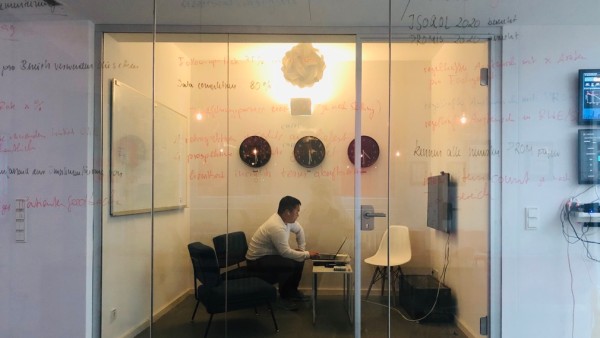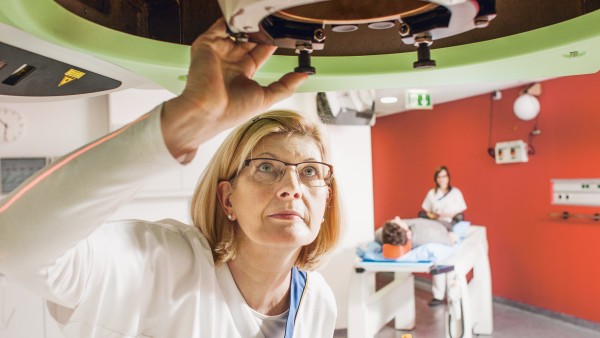How are sick people doing when they are not hospitalised, and stay at home? Yannik Schreckenberger has closed this knowledge gap and contributed to peoples’ recovery with his start-up Heartbeat Medical – not least during the coronavirus pandemic.
About Mr Schreckenberger

Yannik Schreckenberger is Managing Director and Member of the Management Board of HRTBT Medical Solutions GmbH with its brand Heartbeat Medical. He studied physics and has been active as an entrepreneur in the area of digital health since 2010. Heartbeat Medical, established in 2014, employs 36 staff members at its head offices in Berlin, Cologne and London. Its customers are independent hospitals, clinic groups and health authorities. To date, over 100,000 patients have completed the start-up’s questionnaire programme.
Mr Schreckenberger, your start-up Heartbeat Medical specialises in patient-reported outcome measures, or PROMs for short. What exactly is that?
YANNIK SCHRECKENBERGER: We have developed software for digital patient questionnaires and to observe symptoms. We use this to measure patients’ health-related quality of life when they are in their homes. This eases the burden on medical staff and helps with decisions on therapy.
When did you get the idea to become involved in the fight against COVID-19?
When the virus was the only thing anyone could talk about and it became clear how important it would be to detect symptoms early on in potential COVID-19 infections.
When did you begin working with your CoV-19 PROgress monitoring platform?
We started developing the platform at the beginning of March, shortly before the lockdown in Germany, and began deploying it at the end of March. We are providing CoV-19 PROgress free of charge to our existing customers. So far, coronavirus patients numbering in their thousands have taken our online questionnaire. It is primarily used for people who have a suspected infection. If a test is negative, the monitoring is cancelled.
Among the clinics you work with, your most important coronavirus cooperation partner is Charité in Berlin. How did this come about?
We have been working with Charité since 2016. Professor Matthias Rose, Medical Director of the Division of Psychosomatic Medicine there, is a globally recognised PROMs expert. We talked with him early on about how a questionnaire for COVID-19 cases could look.
Please share a few examples of how patients are surveyed using the online tool.
In this case, we ask about numerous symptoms that can lead to a diagnosis with COVID-19 according to current research. These include: Do you have a persistent dry cough or chills? Are you out of breath after climbing stairs? Have you lost your sense of taste or smell?
How much has Heartbeat Medical been involved with COVID-19?
At the end of March we spent several weeks doing nothing else. But we always knew that these particular experiences would also benefit our actual business. We returned to normal mode some time ago.

Yannik Schreckenberger in the London district of Finsbury, north of the financial district.
To date, which illnesses is your software used most often for?
Our system can generally cover all illness patterns. Currently, it is mostly used in orthopaedics after joint replacement surgeries. It also plays a large role in oncology. There it is more concerned with mental health and psychosomatic aspects.
Is the effectiveness of PROMs backed up scientifically?
The number of quality publications about the effectiveness of PROMs is increasing. They also include an evaluated study about lung cancer, among others. Lung cancer patients whose treatment also included a weekly survey of their quality of life lived nine months longer on average than patients whose treatment did not include this. It’s startling when you then know that these types of questionnaire are not mandatory.
Are there individual questionnaires for specific cancers?
The questions are always adjusted to the specific clinical picture, and are supplemented with general inquiries about perception of pain, mobility and
mental stability.
Do patients measure things like their blood pressure or pulse?
We are working on turning our PROMs into a medical product in line with the conditions of the European Union Medical Device Regulation. To do this, we have to guarantee that certain criteria are fulfilled. At the moment we only work with questionnaires, but in future, we will be able to add further data sources.
Is your software also used by doctors’ surgeries?
We receive requests from doctors. But from a business perspective it makes more sense to work with larger entities like clinics and health departments.
Does the system complement visits to the doctor or even replace them?
At the moment it complements them. Yet we imagine that visits to the doctor will no longer be appointment-based in the health care system of the future, and will instead be symptom-based. That means I will not have to go to the doctor just because a new quarter is coming up. This way we free up capacity for new patients in the surgeries.
Does your software generate warnings for patients? Do red or green lights turn on after filling out a questionnaire?
That would be technically possible, but no: the results still need to be interpreted by medical professionals.
The data collected by the PROMs can be used in two ways: to improve the living situation of the surveyed patients, and for research. Do you evaluate the data yourself, or do you provide this data to medical professionals?
Generally speaking, all data remains in the hands of customers. We do not have access to it. But we ask patients if we can analyse anonymised data. If a clinic says that they don’t want us to do that, then we don’t do it. Only clinics that consent to data analysis receive analyses from us. On the one hand, we can use the data to optimise the questionnaires, and on the other, we can report back to doctors about how their patients’ results compare to the average.

In the Berlin premises of Heartbeat Medical, employees confer with colleagues who work from other locations.
Your company works in an industry called digital health. It is repeatedly said that, in comparison to the rest of the world, Germany needs to catch up when it comes to digitalisation. Does the same apply for digital health?
We are now beyond the theoretical discussion and are developing ideas as to how digital health can be implemented in ways that comply with data protection regulations. The German Federal Ministry of Health has very different expertise about this issue than it used to. Among other things, this is demonstrated in the Digitale-Versorgung-Gesetz (Act to Improve Healthcare Provision through Digitalisation and Innovation) that was passed at the end of 2019.
Which countries are leading in the area of digital health?
A lot is happening, especially in the USA and the United Kingdom. And in countries like Latvia and Denmark as well, but digitalisation is easier in smaller countries anyway. When it comes to our area, the PROMs, the Scandinavian countries are significantly ahead of us.
What general conditions need to improve?
The data interfaces in the health care system are hindering innovation. It currently costs a lot of time and money to link data. A lot of software providers for hospitals and surgeries are not prepared to provide internationally valid standard interfaces or charge disproportionately high amounts for it. A law needs to mandate the opening of interfaces. Today’s practices mean that data lands in silos, but with the help of meaningfully linked information, we could improve patients’ quality of life. Heartbeat Medical has since established interfaces to most systems, but new start-ups constantly need to deal with expensive interface problems again and again.
Surveys have shown that venture capitalists in Germany think digital health investments show notable promise. Have you noticed that?
We see investors’ desire to invest in socially sustainable issues. I think that is a positive trend. It has also been shown that digital health is crisis-resistant. At Heartbeat Medical, we are planning to embark on a round of financing discussions so that we can position ourselves even more strongly, also with regard to international markets.
Your company was established in 2014. Where do you see yourselves in 2024?
The EU’s Medical Device Regulation mandates that manufacturers of medical products provide evidence of real benefits. Precisely this evidence is part of our core business: we can support companies, hospitals and doctors because we collect this real-world data. We want to play a leading role in this area in Europe by 2024.
Do you want to expand Heartbeat Medical’s business model?
The PROMs area is so large that we will maintain our focus on that.
And what will the coming years bring in the area of digital health care overall?
We currently have a system that focuses on doctors. I think the focus needs to shift to patients. Digitalisation opens the doors for such a systemic change.
Published on KfW Stories: 17 November 2020.





Data protection principles
If you click on one of the following icons, your data will be sent to the corresponding social network.
Privacy information